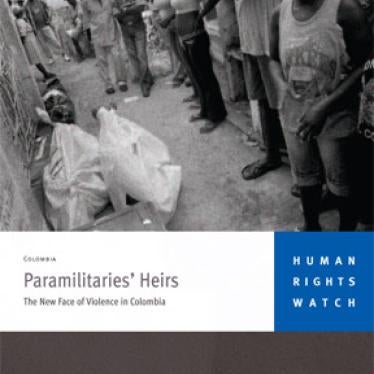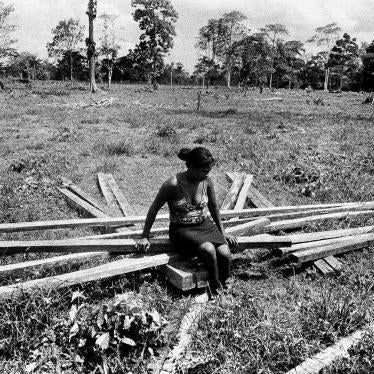Dear Vice-President Garzón,
In anticipation of your upcoming visit to Washington, I am writing to bring to your attention pressing human rights issues facing Colombia. We look forward to discussing these issues and to building on the constructive dialog that we initiated during our trip to Bogotá last October.
Since taking office, President Juan Manuel Santos' government has promoted important human rights initiatives, including draft legislation that would return land to displaced persons and provide financial compensation to victims of abuses by state agents. We have been pleased to see the Santos government's respect for an independent judiciary and public statements of support for the work of human rights defenders, which demonstrate a shift in tone from the previous administration. Nevertheless, we are sure you will agree that Colombia continues to face serious human rights problems that will require bold measures by the current government.
During your visit to Washington, we wish to share our concerns over the persistence of grave abuses in Colombia and recommend several concrete steps the government could take to address these problems, including:
a) The spike in massacres committed in 2010, which surpassed all annual totals since 2005, according to official numbers. One option for curbing these heinous crimes is to strengthen the Office of the Ombudsman's Early Warning System (EWS), and to reform the Inter-Sector Commission on Early Warnings to ensure the transparency of the commission's decision-making.
b) The ongoing high rates of trade unionist killings and widespread impunity for these crimes. In order to establish truth and accountability for crimes against unionists, we recommend you urge newly elected Attorney General Viviane Morales Hoyos to correct her office's flawed methodology for investigating union killings.
c) The continued killings of human rights defenders and social leaders, particularly leaders of displaced persons seeking land restitution. We respectfully recommend that you define and implement a protection policy to guarantee the security of displaced persons asserting their rights to land recovery, as well as families in the process of returning to lost lands.
Massacres on the Rise
In 2010, more massacres were committed in Colombia than in any other year since the beginning of the Justice and Peace process in 2005. The 38 massacres recorded between January and November 2010 represented a 41 percent increase over the same period from the previous year. As we highlighted in our February 2010 report Paramilitaries' Heirs, successor groups to paramilitaries-which emerged out of the flawed United Self-Defense Forces of Colombia (AUC) demobilization process-are a principal actor responsible for these atrocities.
When we met with you and President Santos in October, we were encouraged by your expressed commitment to combat these groups, which the government labels "emerging criminal gangs" (BACRIM). We recognize that the Santos administration has taken positive steps to confront them, including promoting several military and police operations to capture their alleged leaders.
Yet, in light of the historic persistence of paramilitaries, the extensiveness of their criminal networks, and the political and economic power they have amassed, we believe that the Santos government must take further measures aimed at dismantling these groups. This includes ensuring that authorities vigorously investigate and prosecute officials who are credibly alleged to have collaborated with or tolerated successor groups.
One concrete measure to immediately protect civilians from attacks by paramilitary successor groups is to guarantee sufficient funding for the Office of the Ombudsman to expand the operation of the Early Warning System (EWS). The EWS performs a vital role in monitoring risks to civilians posed by armed groups and issuing "risk reports" promoting measures to prevent abuses. The program's regional analysts are often the first state officials to travel to remote areas where there are civilians under threat of imminent attack. That is why it is important that the EWS have sufficient funding to ensure the effective presence of these analysts in the regions where armed groups commit abuses.
In addition, the Inter-Sector Commission on Early Warnings should be reformed in order to guarantee the transparency of its decision-making. The commission is charged with evaluating EWS risk reports and deciding whether or not to recommend that the Minister of the Interior and Justice issue an "early warning" and the corresponding recommendations to authorities to take preventive measures. This transparency will ensure that the commission is held accountable for its decisions. The Inter-Institutional Early Warning Committee-which preceded the current commission-had been criticized for often failing to act based on serious risk reports, sometimes with fatal consequences. Finally, regardless of the characterization of successor groups as criminal gangs or paramilitaries, the commission should recommend emitting early warnings when these groups are on the verge of committing abuses.
Impunity for Ongoing Violence against Trade Unionists
We are also troubled by the alarmingly high rates of trade unionist killings in Colombia, which continues to lead the world in such crimes. Forty-four unionists were murdered in 2010, according to the National Labor School (ENS), Colombia's leading NGO monitoring labor rights. The overwhelming majority of union killings remain unsolved, the perpetrators enjoying impunity: the unit within the Attorney General's Office mandated to prosecute such crimes is only investigating 25 percent of the more than 2,800 ENS-documented killings of unionists since 1986. Out of the reduced number of cases of anti-union violence investigated by the specialized unit, only 15 percent had resulted in convictions as of October 2010, according to official sources.
We would particularly like to bring to your attention the serious flaws in the methodology authorities employ to investigate violence against trade unionists. It is our understanding that cases of crimes against trade unionists are investigated in a piecemeal manner, and many investigations are being closed without a proper inquiry as to whether the motive of the killing was related to the victim's trade union activities. Cases are frequently closed without identifying and holding accountable all persons who bear criminal responsibility, including those who ordered the crimes.
For example, on occasion former paramilitaries giving voluntary confessions in the Justice and Peace process have confessed their responsibility for the murder of a trade unionist by justifying it as the assassination of a guerrilla. Instead of opening an investigation based on the copy of the confession received from the Justice and Peace Unit, the specialized unit dedicated to investigating crimes against unionists has used this self-incrimination to close the case, determining the unionist was a terrorist solely on the basis of the former paramilitary's testimony.
These deficient investigation methodologies have led to impunity for cases of anti-union violence. They have also engendered unfounded conclusions about the nature of union killings, such as the notion that the killings are isolated cases of common crime. These baseless interpretations only aggravate the problem of union killings in Colombia, where 47 percent of all such reported crimes worldwide occurred in 2009, according to the International Trade Union Confederation (ITUC).
While widespread impunity for anti-union violence has resulted in the perpetrator remaining unknown for most killings, evidence indicates that unionists are frequently victims of targeted attacks by armed groups, particularly paramilitaries and their successor organizations. According to the information compiled by the Attorney General's Office and analyses made by the ENS, by far the largest share of the killings are attributable to paramilitaries, who view labor organizing as a threat to their interests and stigmatize unionists as guerrilla collaborators. Moreover, threats issued by successor groups to paramilitaries against unionists indicate they are responsible for many of the recent killings: according to the ENS, of the over 900 threats trade unionists reported receiving in 2008 and 2009, 401 were identified as having come from successor groups.
While state forces are directly responsible for a relatively small portion of union killings, the Colombian state is not exempt from responsibility for such crimes. Paramilitary groups, which are the primary perpetrators behind anti-union violence, have historically acted-and continue to act-with the toleration or even active support of members of the public security forces. State complicity with paramilitaries is not limited to the armed forces: in recent years, over 100 members of Congress have come under investigation for alleged ties to paramilitaries. The former director of the national intelligence agency (DAS) from 2002-2005 currently stands trial for delivering information to paramilitaries about trade unionists and other social leaders who the paramilitaries subsequently assassinated.
The appointment of Viviane Morales Hoyos as the new Attorney General represents a valuable opportunity to correct the flawed methodologies used to investigate union killings. We respectfully ask that you bring these deficiencies to Attorney General Morales' attention and urge her to ensure that prosecutors investigate union killings as part of a pattern of crimes that takes into account the victims' union, the time period and location in which the crimes occurred, as well as the context of armed groups operating in the region where the crimes were committed. Prosecutors should identify the motives behind the crime and prosecute not only the direct perpetrator of the killing, but all persons who bear criminal responsibility, including those who ordered the assassination. These changes will be vital to reducing impunity for union killings and establishing the truth surrounding these abhorrent crimes - both essential conditions for curbing present day abuses.
Recurrent Murders of Human Rights Defenders and Social Leaders
Finally, we would like to raise our concern about the continued killings of human rights defenders and social leaders. We are particularly troubled by the reported murders of at least seven leaders of displaced persons in 2010, including the November killing of Óscar Maussa, who had been granted precautionary measures by the Inter-American Commission on Human Rights (IACHR) in 2006 as a result of threats he had received from paramilitaries.
We commend you for publicly condemning Maussa's murder and calling on authorities to investigate the crime and punish those responsible. We believe your statements conveyed a crucial message that the Santos government will not tolerate violence against persons seeking land restitution.
Nevertheless, the killings continue. As you publicly recognized, the body of displaced persons leader José Alfonso Delgado Villamil was found in the state of Tolima in early January 2011. Villamil's death adds to a list of more than 45 leaders of victims groups campaigning for land restitution who have been killed since 2005. Authorities found Villamil's body alongside the cadavers of two other members of a displaced persons' organization; all had reportedly been displaced by paramilitaries from the Sierra Nevada de Santa Marta.
We are very encouraged that the Santos government has made it a priority to return millions of acres of stolen and abandoned land to displaced persons. The success of these land restitution initiatives will depend on the government's ability to develop and implement an effective policy to prevent these killings and vigorously investigate the crimes when they occur.
Colombia's long-standing and entrenched human rights problems will not be solved overnight. Yet, in light of their seriousness and urgency, and the current government's new approach, we believe that President Santos' administration has the potential to improve Colombia's human rights situation. To do so, Colombia will have to reevaluate its human rights policies and practices, as well as consider adopting the basic recommendations included in this letter. We look forward to a productive discussion of all these issues during your upcoming visit to Washington.
José Miguel Vivanco
Americas Director






